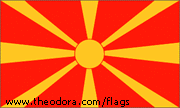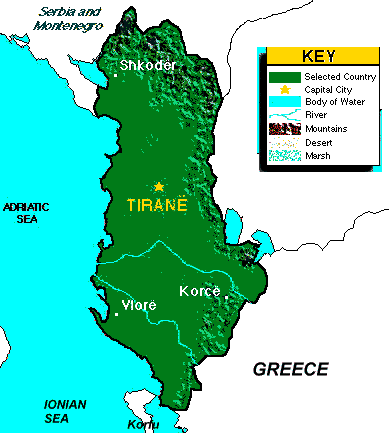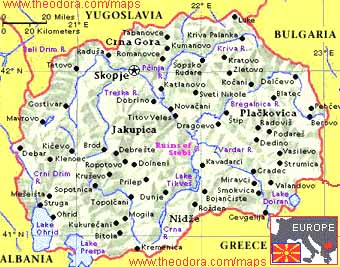



Easter 1999
The border official looked bemused by the sight of two backpackers. "Tourists?" he asked incredulously as he filled out our visa cards. We paid US$37 to enter a country the size of Wales, that the rest of the world wanted to avoid. "You are welcome to Albania, " he added.
We were both pleased and surprised at this reception. Three days earlier, Nato had started the bombing missions on Serbian Yugoslavia and the Foreign Office had raised the level of danger of Albania to that of Algeria and Iraq. We had left England watching the television news of demonstrations in Athens, riots in Skopje, and Kosovan refugees flooding into Albania.
Determined not to have our Easter holiday plans disrupted, my friend Trevor Lovett and I flew to Athens and bussed up to the Albanian border at Kakavija, north of the Greek City of Ioannina. We did not know what to expect, or if we would even be allowed in. At the sleepy border crossing late on a hot, dusty Sunday afternoon, nobody was heading into Albania but a mile long trail of cars and trucks were inching their way out. We negotiated a taxi ride to the first major town of Gjirokastra. Our young driver, Namil, drove a large black Mercedes, probably stolen from Greece or Italy. Gangster ambush stories were common, but as we roared along the road - more potholes than road - we felt safe enough.
Two things are striking about Albania. Firstly, the thousands of tiny military bunkers, the remains of the old communist defence system, that mushroom out of the ground. Secondly, the smashed and burnt-out car wrecks that litter the roadsides everywhere.
Albania last hit the news headlines two years ago with the 'pyramid-scheme' riots. The hillside town of Gjirokastra, known as the "town of a thousand stairs", had been in the thick of it, but it is still a beautiful old Turkish town with steep narrow cobbled streets and an impressive citadel. Within the fortress lies an old US reconnaissance plane that had made a forced landing back in 1957. History seemed to be repeating itself.
Mr Kotoni offered us a room at his house 'Haxhi Kotoni' which had an excellent reputation. The guest book indicated that all journalists sent to Albania had stayed here. They left interesting comments like "Great hospitality, food and home comforts - shame about the gunfire all night". Over plum brandy with his family, we discussed the latest problems. Their last foreign visitors had spent New Year's Eve with them.
Albania may be the poorest country in Europe but it does have excellent public transport. There are regular buses, trains and an army of minibuses taking you everywhere except the Kosovan border. Few of the passengers had ever seen English people and they practised their English to discuss the war with us. Nato's reaction to a difficult situation was receiving an appreciative response; at least someone was trying to do something about it. Most Albanians we met felt that Kosovo's destiny was as an independent state rather than a satellite region.
South of Fier, a lively regional centre, lay a valley of oil fields with decrepit nodding donkeys. The smell of sulphur flooded our nostrils. More disturbingly, crude oil was seeping into the rivers turning them milky white. Pollution appeared to be a major problem in Albania. Later on, we saw the ruined shell of a copper smelting plant that had huge chunks of asbestos padding around rusty pipes right next to the main road. The Government apparently cannot afford to clean the country up.
Basing ourselves at Durres, the second largest city on the coast, we were able to make daytrips around the northern half of the country. Durres is a pleasant industrial city with a commercial port. The range of shops and the number of local girls wearing western fashions indicated that some income was being generated here.
The coastline of Italy can be seen from Durres and there has always been a large Italian population here. We tracked down Mr Romeo Harizi, a retired veterinary surgeon, who rented us a room in his house on the seafront. He lived behind a wall fortified with broken glass, barbed wire and iron gates and he was very worried about the increasing gangsterism within Albania. When we attempted to visit King Zog's 1930's art deco palace on a nearby hill, we found young Italian soldiers guarding it as a military base.
The capital, Tirana, is a sprawling low-lying city of 400,000 people. Crowds of moneychangers hung around the central Skenderbeg Square, waving large wads of Leke currency. The banking system was obviously still mistrusted after the previous financial problems. A huge Nato flag had been hung in front of the cultural centre and the National History museum had been closed down, but no one could explain why.
The national sports stadium had been converted into a refugee camp. Dozens of soldiers and policemen guarded the entrance while truckloads of Kosovans were processed and led into the arena. Local Albanians peered over the fences attempting to trace relatives inside. There were chaotic traffic jams when the main road outside was shut down to allow more trucks into the compound.
A Spring Trade Festival was being held in the impressive pyramid shaped Exhibition Centre (formerly the Enver Hoxha Museum, dedicated to the Communist dictator who ruled Albania between 1941 and 1985). A handful of local companies were promoting products such as mobile phones, cosmetics and honey.
The representative of Tirana Beer poured us some samples whilst reminiscing about the state of the country. "The people of Albania have been given freedom, but they don't know what to do with it. They think democracy means the right to steal from each other". He seemed genuinely aggrieved to have lost the security of the old Communist system where everyone had a job and the streets were safe at night. We learnt that the Government had suspended taxation indefinitely and that everyone still got free electricity and water, but no-one knew how the country was being financed. Whatever the current problems, Albanians are very friendly, with a happy-go-lucky attitude. They are used to dealing with one crisis after another and put a brave face on it all. "Life's like that" seems to be a national belief.
An hour north of Tirana lies Kroje, a silent and picturesque hill town. It was the fifteenth century headquarters of Albania's most famous resistance fighter, Skenderbeg, and the place from which he held back the Turkish advances. The artisans' quarter, with its many souvenir stalls, was deserted except for the now familiar scenes of goats and sheep being tended as they grazed. Cockerels crowed incongruously against occasional thundering noises behind the hills. We frequently saw pairs of military jets soaring high above heading for Serbia and we heard sporadic explosions and gunfire all around the country but never knew its exact location.
On the minibus along a barren unsurfaced road to Shkodra in the far north, we met a 64-year-old American-Albanian, Ramiz, who had escaped by boat back in 1957. He had made some money in New York, and was returning to attempt to revitalise his home town's economy by opening a factory that made plastic windows. So far, he had spent seven months in the law courts and found the "Albanian mentality and bureaucracy unbelievable". Apparently they would rather prevent than encourage any new industry.
Despite his obvious frustration, he pointed out old military bases dug into the mountains and told us about the inhumane conditions that had produced these secret defences. He roared with laughter as he recalled a story from the riots two years previously, when locals had stormed the base and someone had attempted to steal a MIG15 fighter hidden in the caves. Climbing into the cockpit, the first button the would-be thief had pressed had been the ejector seat.
Shkodra is only a few miles from the Montenegran border and about 70 miles from Kosovo so we expected to find Nato forces everywhere. Montenegro was being bombed when we left England and we had heard nothing on the BBC Home Service to indicate otherwise.
It was a therefore a shock to find a regional centre operating as normal with no signs of a war going on. The streets were full of market stalls and the magnificent Turkish Rozafa Fortress which dominates the landscape was being visited by a local school party. The neighbourhood blocks of flats were awash with satellite dishes, yet most of the traffic was horse-drawn.
Refugees were usually moved around the country at night in covered army trucks. Returning to Tirana late one afternoon however, we followed a military convoy guarding half a dozen minibuses containing Kosovan refugees. Old women with young children peered through the windows, their bedding and possessions filling the back of the vans. We were seeing the first waves of refugees before the flood.
There had been anti-Nato riots in Skopje, the Macedonian capital just before our departure. A week later, we were unsure of the situation, but the hospitable Albanian reception had boosted our confidence. We walked into Macedonia via a deserted border crossing south of Lake Ohrid. The official tried to look unsurprised at seeing backpackers but finally piped up "You do realize there is a war going on?"
At the first village, an OSCE vehicle containing European security monitors stopped to chat and told us that Skopje was "relatively safe" during the day, but "very unstable" at night. Impressed by our Albanian exploits, they told us to be careful. As far as they knew, there were no other tourists in the country.
Lake Ohrid, the deepest in Europe, lies among towering snow-capped mountains with a landscape that is simply stunning. Ohrid town, once a popular resort before the war, is famous as a medieval religious centre, containing the UNESCO-protected churches of Sveti Sofija and Sveti Kliment. In the latter, the guide thought we were military personnel on leave. Delighted to have visitors after weeks of isolation, she gave us a wonderfully comprehensive explanation of the vividly restored thirteenth century frescos. She also expressed pessimism about the inevitable decline of the town if the war persisted.
Macedonia is a very clean and tidy country. After Albania, it was a culture shock to see well-maintained roads with no litter or wrecked cars. The atmosphere, however, seemed more tense. The people were not happy about Nato forces occupying their country. Even if Kosovo was a neighbour, they did not want to be involved or have to deal with the exodus of refugees. As we walked past the shops one evening, someone yelled "Yankee Go Home". Immediately, another local man came up and said, "Please ignore him. You are our friends".
On the bus to Skopje, we passed through beautiful gorges and skirted round dams and magnificent lakes. When the war is over, Macedonia will have a potential tourist industry just waiting to erupt. Approaching Tetovo, the enormous Sar Planina mountain range separated us from Kosovo just ten miles north. The terrain was very rugged and a Nato ground assault appeared impossible until the snow melted. Outside Skopje, German and British military convoys appeared on the roads moving equipment around the northern edge of the country.
A major earthquake flattened Skopje in 1963. With the resulting international aid, the city was quickly rebuilt on a communist blueprint using revolutionary designs. Thirty-five years on, these buildings are shabby and crumbling. The old town still retains some character but generally it is a nondescript eastern European city in need of revitalisation.
Arriving at the bus station, we found it guarded by soldiers. Unsure of what reception we might get, we adopted temporary Australian nationalities for our stay but did not encounter any problems apart from persistent begging by gypsy women and polio victims. The buildings had anti-Nato graffiti sprayed everywhere. We could not understand the language but picked up on the phrase "Adolf Clinton". Throughout the city which has a population of 600,000, the target symbols used by Yugoslav peace protestors were pasted onto every billboard. MacDonalds, however, was packed, and every café had an American name.
On the road back to Ohrid, the police stopped the bus and everyone had to produce their papers. We were used to routine checks and usually being waved on, but today there was a comprehensive search. Three well-dressed Kosovan refugees with small suitcases were escorted off the bus at gunpoint. The bus driver was very anti-Kosovan and taunted the refugees. He sang the Macedonian anthem and jeered at them. We kept a very low profile.
When we crossed over into Greece at Florina, we watched the television news in a café for the first time in ten days. We had been completely out of touch. The waiter translated the news whilst looking in disbelief at the footage of a Belgrade hospital burning down. Nato was certainly not winning the hearts and minds of the Greeks.
It had been a strange but exciting trip. We had seen no other westerner in either Albania or Macedonia, except military or security forces. We had witnessed the early refugee fall-out from the war and visited every major tourist sight in both countries. It may take years for the area to settle down, but when it does it will be well worth a visit to witness Albania, the last Communist country, readjusting to a strange future and to tour Macedonia's stunning scenery. Whatever your experience, you won't be disappointed.

